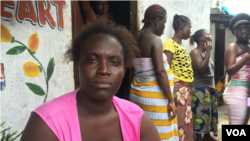Liberia’s reputation for graft has international donors and many Liberians concerned that aid money pouring in to help the country recover from Ebola may disappear into the maw of corruption.
The international community has pledged nearly $5 billion to help West Africa fight and recover from the Ebola outbreak. But systemic fraud and mismanagement in Liberia has donors concerned the people who need the money most won’t see it.
Liberia Deputy Information Minister Isaac Jackson said his government has taken these concerns into account and the international community should be reassured.
“We’ve been able to put in place some of the best measures in accounting for the Ebola money," said Jackson. "As we speak, the minister of finance and development planning, the Honorable Amara Konneh, has challenged all ministries and agencies that received Ebola money to carry out proper accountability, meaning they will have to account for Ebola money.”
Rampant corruption
Many Liberians, however, remain skeptical. The country is notorious for corruption, which keeps almost every part of society in its grip. Even President Ellen Johnson Sirleaf’s own family has been tainted by graft allegations.
Now, the United States Agency for International Development [USAID] has sent an auditing team to Liberia to look into Ebola projects. This pleases many Liberians who think the team will hold the Liberian government accountable.
The U.S. effort, however, has a different mission, according to Doug Mercado, the leader of USAID’s special response in the fight against Ebola in West Africa. He said it is neither a financial audit nor an audit of the Liberian government.
“This is a standard routine audit that USAID regularly conducts in any kind of situation throughout the world," he said. "It’s a performance audit just to work with our partner to make sure that the program they ran with our funding was achieving the objectives that we set out to achieve initially. So it’s just some routine monitoring to make sure that what we set out to do we’re actually doing, and doing effectively.”
Mercado did not say which particular projects in Liberia will be monitored. U.S. assistance to combat Ebola in West Africa - administered through USAID, the U.S. Centers for Disease Control and the U.S. military - stands at more than $1.3 billion.
Tracking money
Silas Siakor is the founder of SDI, a local research institute that has for years monitored misuse of money in Liberia’s mining, forestry, and agriculture sectors. He said a financial audit of U.S. assistance would be very welcome because it’s not always the Liberian government that wastes money.
“We have seen a lot of waste in the natural resource sector. USAID money going to U.S. agencies working in the natural resource sector," said Siakor. "Millions of dollars. And we’re seeing extremely limited impact on the ground. So we’re very concerned that a lot of the money that was appropriated by the U.S. government for Ebola response could end up similarly where it leaves nothing behind in the public health sector in Liberia.”
According to Siakor, the U.S. government has spent about $25 million to protect Liberian communities from lumber companies who sometimes cut down all the trees and leave the land barren. Given that amount, he has seen very little improvement for the communities where the aid money was aimed.
Siakor said a lot of aid money also goes into the salaries and housing costs of foreign development staff. The majority of aid agencies are based in Monrovia, the capital. Liberia is one of the poorest countries in Africa, but a simple room with running water and stable electricity in Monrovia easily costs $1,000 per month; a good hotel room can go for $100 per night.












